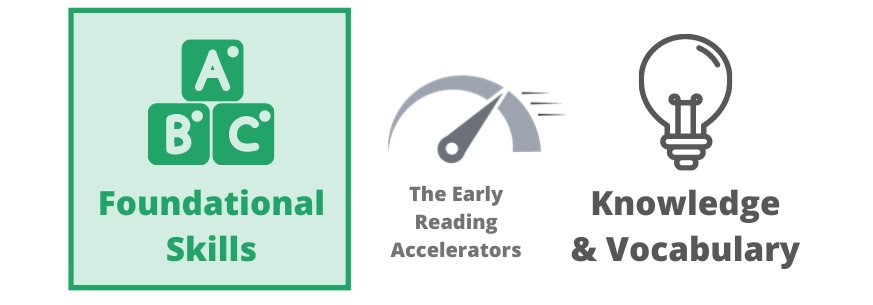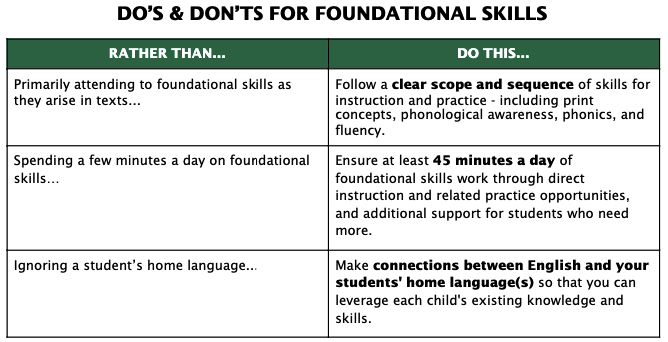Foundational Skills (K-2)

As the building blocks of early reading and writing, secure foundational skills are crucial for students' success in literacy and so are key enablers of equity.
A robust body of research tells us that systematic, explicit foundational skills instruction is crucial for students as they are learning to read and write in English. Reading the words on the page is not just an end goal in and of itself, but a stepping stone that allows us to interact with and learn about the world.
Structured foundational skills instruction in English moves young readers and writers along a continuum of skills in four key areas:
.png)
 Foundational Skills Key Concepts and Terms. See this quick-reference sheet defining the key terms related to reading foundational skills, including the four key areas noted above.
Foundational Skills Key Concepts and Terms. See this quick-reference sheet defining the key terms related to reading foundational skills, including the four key areas noted above.

Related Collections
Foundational skills, together with building knowledge and vocabulary, accelerate early literacy and form the “Early Reading Accelerators.” See this Quick Start Guide for an overview of the Early Reading Accelerators and how we can implement them for all students. To better understand Foundational Skills, explore these additional Collections:
 Early Reading Accelerators. The Early Reading Accelerators are essential content all readers must access to become proficient. This Collection provides an overview of the Accelerators, with emphasis on ways to implement these concepts in the 2020-21 school year.
Early Reading Accelerators. The Early Reading Accelerators are essential content all readers must access to become proficient. This Collection provides an overview of the Accelerators, with emphasis on ways to implement these concepts in the 2020-21 school year.
 Knowledge & Vocabulary. Reading ability and knowledge about the world are tightly connected. This Collection has techniques and practices to leverage and grow each student's knowledge of the world with their reading ability.
Knowledge & Vocabulary. Reading ability and knowledge about the world are tightly connected. This Collection has techniques and practices to leverage and grow each student's knowledge of the world with their reading ability.
Resources
.png) If you are an early-grades teacher, you already know that supporting students on their journey to proficient decoding and encoding is skilled, nuanced work. How do we know that we have the knowledge we need and are using materials and instructional practices that are research-based and supportive of students? Use the resources below to find out and to support your work with students.
If you are an early-grades teacher, you already know that supporting students on their journey to proficient decoding and encoding is skilled, nuanced work. How do we know that we have the knowledge we need and are using materials and instructional practices that are research-based and supportive of students? Use the resources below to find out and to support your work with students.
Key Things to Know
Do I have the foundational skills content knowledge I need?
Phonemes, graphemes, prosody, phonological awareness, rhymes, and rimes …there is a whole lot to know about how language works! Many of us have not had opportunities to engage in deep learning about the foundational skills of English, and it is not always prioritized in teacher preparation or professional development. If this is the case for you, building your own teacher knowledge of this content will help ensure you are able to best support your students.
 Research Recap: Why the Early Reading Accelerators. What does research tell us about how proficient reading works? This quick resource explains key takeaways from reading science and their impact on early reading instruction.
Research Recap: Why the Early Reading Accelerators. What does research tell us about how proficient reading works? This quick resource explains key takeaways from reading science and their impact on early reading instruction.
 Foundational Skills Guidance Document. This document outlines essential instructional components of teaching early reading skills and includes helpful rules of thumb, suggested activities, and grade-specific best practices for K-2.
Foundational Skills Guidance Document. This document outlines essential instructional components of teaching early reading skills and includes helpful rules of thumb, suggested activities, and grade-specific best practices for K-2.
 Foundational Skills Mini-Course. This mini-course is a free, seven-part virtual learning experience. Watch the videos and complete activities on your own, or make a plan to watch and discuss activities with colleagues. Certificates verifying professional learning credit hours are available.
Foundational Skills Mini-Course. This mini-course is a free, seven-part virtual learning experience. Watch the videos and complete activities on your own, or make a plan to watch and discuss activities with colleagues. Certificates verifying professional learning credit hours are available.
Learn More About Foundational Skills
- How the Brain Learns to Read (Amplify) Guide
- Foundational Skills to Support Reading for Understanding in K-3 (Institute of Educational Sciences) Practice Guide
- Teaching Reading Is Rocket Science (Louisa Moats & AFT) Report
Materials
Are the instructional materials I'm using to teach foundational skills standards-aligned and research-based?
Foundational skills materials must follow a clear scope and sequence of skills based on what is needed for learning to read and write in English--including print concepts, phonological awareness, phonics, and fluency--and provide ample opportunities for student practice.
 Features of Structured Foundational Skills Checklist. Use this checklist to determine whether your materials have the key elements needed to support strong instruction and practice.
Features of Structured Foundational Skills Checklist. Use this checklist to determine whether your materials have the key elements needed to support strong instruction and practice.
 Free Foundational Skills Instructional Materials. Ready to try free, research-based, and standards-aligned foundational skills instruction materials? Consider these open source programs.
Free Foundational Skills Instructional Materials. Ready to try free, research-based, and standards-aligned foundational skills instruction materials? Consider these open source programs.
-
Phonological and phonemic awareness work activities like this one for Kindergarteners or first graders, are an essential ingredient of strong foundational skills materials. You can see more model teaching videos and get the lesson plans from this free, comprehensive phonological awareness program here: Best for All Sounds: Sounds First Phonemic Awareness Program.
Delete the first sound from the second syllable in a two-syllable word. (Found in TN Materials: Kindergarten, Week 19; Grade 1, Week 3)
The resources below can be used with any foundational skills program or scope and sequence to support teaching and learning.
 Effective Enhancements: Make Foundational Skills More Fun! When children are playing games, singing songs, chanting, or engaging in movement activities, they are having fun while practicing foundational skills. Here are suggestions for activities that can be done in-person or remotely to effectively enhance your foundational skills instruction.
Effective Enhancements: Make Foundational Skills More Fun! When children are playing games, singing songs, chanting, or engaging in movement activities, they are having fun while practicing foundational skills. Here are suggestions for activities that can be done in-person or remotely to effectively enhance your foundational skills instruction.
Attending to Foundational Skills Instruction and Culturally Responsive-Sustaining Education. Materials alone can’t provide instruction that thoughtfully addresses the individuals in the room with culturally responsive-sustaining practices. This blog post and two-page resource focus on adapting existing foundational skills materials to make lessons rich and relevant for the unique needs of the children in your classroom.
-
First graders practice a new sound and spelling pattern (i_e) in the context of intentionally constructed decodable text that is based on taught foundational skills. Use this decodable reader protocol with supports for English learners with your readers to ensure essential application practice.
Support or Supplement Your Instructional Materials
- Foundational Skills Practice Resources For K-1 Practice Resources
- Fluency Packet for Grades 2-3 - Texts & Audio Recordings Student Resource
- Early Reading Acceleration Practice Activities for K-1 Practice Resources
My Practice & Student Supports
Is my instructional practice aligned to research and supportive of all students mastering foundational skills?
There is no one-size-fits-all approach to the evidence-based practices for early reading. Each child’s needs, progress, and pacing will vary, and adjusting to fit their needs, monitoring progress through formative assessment practices, and providing support is the only way to ensure that each student learns to read.
 Foundational Skills Observation Tool. Use this tool to reflect on your own practice, plan a foundational skills lesson, or engage with your peers at an upcoming professional learning community.
Foundational Skills Observation Tool. Use this tool to reflect on your own practice, plan a foundational skills lesson, or engage with your peers at an upcoming professional learning community.
Am I addressing the needs of English learners?
Students who are learning to read and write in English will need the same systematic instruction, but for second language learners you may be able to capitalize on strengths and knowledge from students’ home language. If students are in a dual language environment, explicitly teach the connections and differences between the additional language of instruction and English.
What About Leveled Reading?
Leveled reading approaches often do not include essential structured foundational skills instruction, or texts that match readers’ needs. In the words of Professor Alfred Tatum, Dean of the College of Education at the University of Illinois-Chicago, “Leveled texts lead to leveled lives.” Here's why and what you can do about it:
Coaches & Instructional Leaders
.png) Coaches and instructional leaders do important work to support teachers and students engaging in the foundational skills Early Reading Accelerator. This instructional priority should be a hallmark of high-quality professional learning and coaching in the early grades.
Coaches and instructional leaders do important work to support teachers and students engaging in the foundational skills Early Reading Accelerator. This instructional priority should be a hallmark of high-quality professional learning and coaching in the early grades.


.png)
